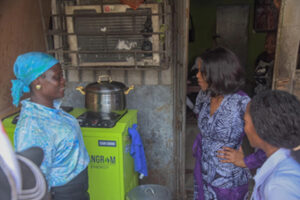In Nigeria, over 176 million people relying on traditional biomass fuels such as firewood and charcoal. This dependence not only poses serious health risks particularly for women and children—but also contributes to environmental degradation and greenhouse gas emissions. To address these challenges, Nigeria’s Energy Transition Plan (ETP) has identified clean cooking as a priority, aligning with Sustainable Development Goal 7 (SDG7) to ensure universal access to modern and sustainable energy.
In support of this transition, Tangram Energy Ltd with support from Sustainable Energy for All (SEforALL) implemented a solar cookstove pilot aimed at demonstrating the commercial viability of clean cooking solutions in Nigeria.
The pilot in Iponri Market in Lagos, provides high-quality solar cookstoves equipped with battery storage to women-owned businesses. These cookstoves serve as an alternative to traditional cooking methods, significantly reducing emissions, improving indoor air quality, and enhancing health outcomes.


Beyond deployment, the initiative focuses on building a sustainable business case for clean cooking technologies.Beneficiaries receive training on cookstove operation and maintenance, while a local service centre ensures ongoing support. Additionally, data collection on usage and impact is underway to inform future scaling efforts.
On December 3rd 2024, a demonstration event was held at Iponri Market, supported by the Ford Foundation and SEforALL. The visit provided firsthand insights into Tangram Energy’s battery-swapping technology, enabling market women to transition away from petrol, kerosene, and firewood for cooking. Participants reported not able improvements in cooking efficiency, reduced costs, and increased business productivity, reinforcing the potential for wider adoption of clean cooking solutions in Nigeria.